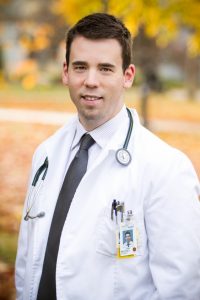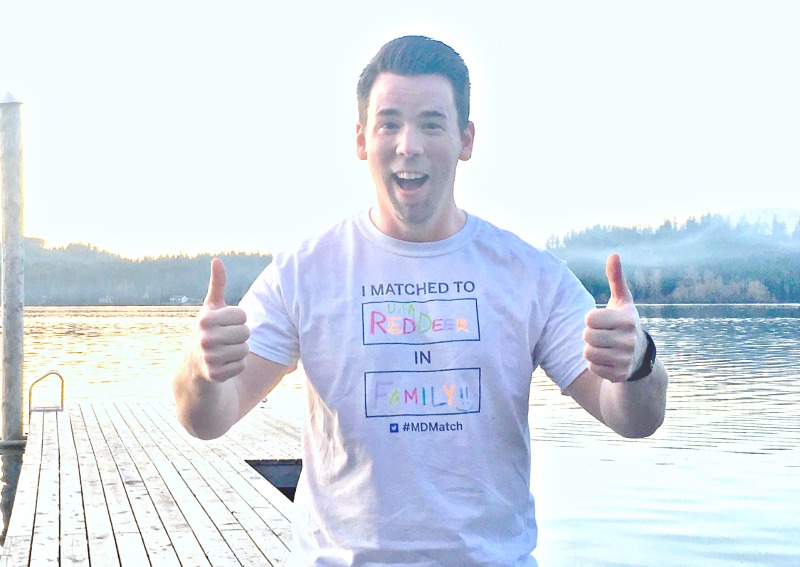
Mike Bergunder in his first year at the UBC MD program.
When Mike Bergunder started the MD program four years ago, we asked him about his journey to medicine and the challenges he faced. These were his words:
I remember first wanting to go into medicine when I was eight years old. I watched as my mom underwent numerous surgeries and hospital visits. I saw how medicine could completely change someone’s life and the positive impact a physician could have on another human being.
There were times when I felt like I would never get into medicine. I remember my first organic chemistry midterm – it scared me quite a bit and I thought I’d never make it through. I remember when my wife was diagnosed with Leukemia and I had to delay my med school application. I’ve had other challenges and moments of self-doubt, but I did my best to push through and eventually got to where I needed to be.
Other people in my life always believed me when I said I was going to become a doctor. They saw a driven young man who would get what he wanted if he stayed focused. My opinion was often dampened when I saw how amazing other applicants were. I had moments where I had to remind myself that I was good enough.
Giving back to my community is important to me. When I am finished my studies, I plan on returning to the Tri Cities area, where I grew up, to set up a family practice. I would also like to offer services to the urban Aboriginal population of Vancouver and also spend time each year visiting rural reserves that don’t have access to health care.

This May, Mike is set to graduate from UBC’s MD program along with eight other Aboriginal students. In 2002, UBC set out to graduate more than 50 Aboriginal MDs by 2020. The goal was achieved five years ahead of schedule in 2015. We wanted to ask Mike how his experience has been, what his future plans are and what advice he has for other young Aboriginal students who are interested in a career in medicine.
What is the biggest lesson you learned during your MD Undergrad years at UBC?
That’s a tough question to answer… I learned a lot during medical school. Not just about medicine, but about my passions, my fears, my goals and myself. But I’d have to say the biggest lesson I learned in medical school would be that this is just the beginning of a lifelong journey through an amazing, challenging, and rewarding career. I’m so lucky to be in this position and I am so thankful for all of the lessons that got me to where I am today.
As an Aboriginal student, how did you feel supported during your 4 years in the MD program?
I felt well supported throughout medical school and a large part of that support came from James Andrew, Aboriginal Student Initiatives Coordinator. He, and other faculty members like Leah Walker, worked hard to ensure we were supported as individuals and also as a cohort of Aboriginal students. We had multiple opportunities to engage in cultural events throughout medical school with Aboriginal students in all four years of medical school as well as our alumni. The chance to meet other Aboriginal students in various years of training added an extra layer of support and being able to participate in cultural events helped many students stay grounded and feel a sense of connection throughout medical school.
What advice would you give to Aboriginal students who are wishing to pursue a medical degree?
If your goal is to become a doctor, the best advice I can give is don’t give up and work hard! The path isn’t always the easiest, but it’s the challenges that we face that make us who we are. Medical School is a challenge, but it is worth the effort. If I could add one thing: I’d also like to point out that balance is key and as such, pursuing passions outside of medicine will help tremendously and will get you to where you want to be!
What’s next for you? Are your ambitions the same as when you first started the MD program?
Well, I matched to a fantastic rural family medicine residency program in Red Deer through The University of Alberta. I’ll be moving there this summer for two years and when I’ve completed residency I hope to be able to set up a full-scope practice and work with underserved Aboriginal communities.